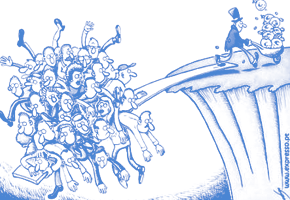Give and Take
29th September 2014
The “Matthew Effect” is well documented in sociology and economics.
For unto every one that hath shall be given, and he shall have abundance: but from him that hath not shall be taken even that which he hath.
—Matthew 25:29, King James Version.
Or - “the rich get richer and the poor get poorer.”
Sadly, it also occurs in terms of academic success. This is all the more depressing when we are actually trying to prevent or redress educational inequality.
When I trained as a teacher, a popular element of all courses was to look at the Rosenthal research, where a group of students were randomly classed as “very bright” or as “a long way behind.” The teachers were told which group the pupils belonged in. Each group contained the full ability range. At the end of a term the pupils in the “bright group” had all made good progress, the “behind group” had all achieved less. So the pupils had fulfilled their label even though it was arbitrary. This was always required reading to highlight the damaging effect of low expectations by teachers.
But expectation alone cannot account for the differing performance; there must also have been a modification of teaching to each group.
I often look at work from struggling writers; their books are littered with positive comments and smiley faces, which is obviously good for their sense of self worth. What they don’t get, however, is the kind of developmental feedback “you need to add two adjectives to this sentence”, which would improve their work. Maybe this subtle change in feedback is the cause of the failure.
Don’t say it’s good if it’s not; praise the effort and the improvements, but not the total outcome if you can suggest a couple of improvement points.
On a recent training course a teacher of KS3 asked me if she should ever correct EAL learners English. I was somewhat taken aback; you obviously don’t humiliate and belittle, but if you know that you have taught a language item then a little reminder is absolutely in order.
The key points would be to focus on the message the pupil is communicating, perhaps ask key questions to clarify and show where there might be an error, then model and explain. This should all happen relative to the stage the pupil is at. Unchecked errors do nobody any favours; at the very least, make a note in your mental or actual notebook, so you can address it later in a teaching context.
|






